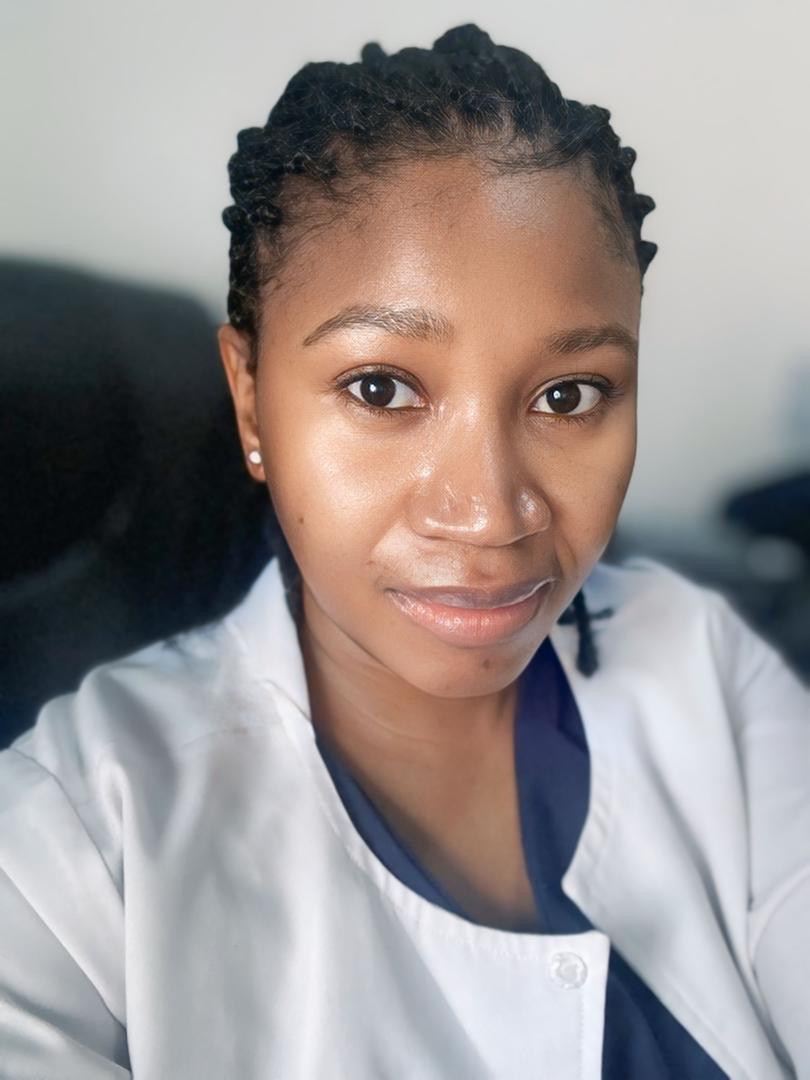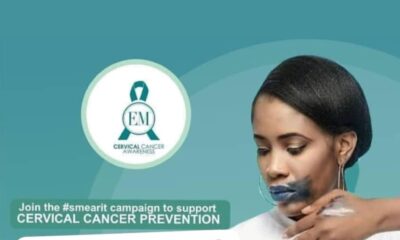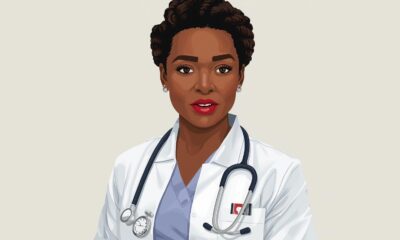Health
#StopHPVForHer: Dr Nguper Dooyum-Laha on HPV & Her Hope for Future Generations
Cervical cancer is preventable, and Dr. Nguper Dooyum-Laha of Medicaid Cancer Foundation wants every Nigerian woman to know it.

What if one conversation could change how we think about cervical cancer in Nigeria?
Cervical cancer remains one of the most preventable forms of cancer, yet it continues to claim thousands of lives each year, largely due to misinformation and limited access to screening. At the centre of the crisis is the human papillomavirus, or HPV, a virus that can be stopped long before it becomes fatal.
Vaccines and regular screenings offer real protection, but misinformation and limited access often keep many women unprotected. Awareness remains the missing link, and that’s where conversations like this one come in.
In this conversation with Dr. Nguper Dooyum–Laha, Senior Medical Officer at Medicaid Radiodiagnostics and Medical Coordinator at the Medicaid Cancer Foundation in Abuja, she shares what prevention really looks like, how information – when shared widely, can become its own kind of medicine.
Doctor, some Nigerian parents hear “HPV” and get confused without really understanding what it is. Can you break down what HPV actually is and explain the connection between HPV and cervical cancer?
HPV stands for Human Papillomavirus. It is a sexually transmitted virus responsible for more than 90% of cervical cancer cases. Almost every adult who has ever been sexually active will be exposed to HPV at some point.
In most cases, the body clears the infection naturally. However, in some women, certain “high-risk” types of HPV persist in the cervix and gradually cause changes in the cells. These changes include interference with our normal DNA repair processes. Over several years, this can develop into cervical cancer, one of the deadliest cancers among Nigerian women today. HPV causes other cancers as well, such as anal cancer, oropharyngeal cancer, vulvar cancer, vaginal cancer, and penile cancer.
As the Medical Coordinator for the Medicaid Cancer Foundation, you have a unique insight into the patient journey. What is the single most powerful tool you deploy at MCF to stop the cervical cancer journey before it starts for Nigerian women?
The HPV vaccine. The HPV vaccine can drastically reduce HPV infections, which are responsible for over 90% of cervical cancer cases. The encouraging news is that we are also beginning to see the benefits of herd immunity from vaccination.
This means vaccination doesn’t just protect vaccinated individuals, it protects entire communities.
Girls as young as nine can get vaccinated against HPV, yet many parents think this is too early…
It’s not too early at all. Children receive vaccines from birth, like the BCG vaccine to protect against tuberculosis, because we want them protected before exposure. The same principle applies to the HPV vaccine.
We recommend vaccination from age nine to fifteen because most girls (and boys) at that age have not yet been exposed to sexual activity. The goal is to fortify the body’s immune system before any possible exposure to the virus.
Physiologically, younger children also mount stronger immune responses to vaccines, providing longer-lasting protection than if vaccinated later in life.
There’s a persistent concern among some parents that vaccinating daughters against HPV might send inappropriate messages about relationships. How do you address this misconception, and what would you tell a parent who feels conflicted?
Let’s be honest, with the rise of social media, children today are exposed to adult content earlier than before.
Rather than worrying that vaccination sends the wrong message, we should focus on proactively educating and protecting our children. Our goal is to ensure the next generation is free from cervical cancer, just like previous generations worked to eradicate diseases like smallpox and polio.
We know that even vaccinated girls will need routine screening later in life. Can you explain to parents why, even with the vaccine, future screenings remain a crucial safety net in a young woman’s life?
Screenings remain crucial because the HPV vaccine doesn’t protect against every single strain of the virus, only the most dangerous ones.
Until HPV infections are eradicated, regular cervical screenings serve as a safety net to catch any abnormalities early. It’s an extra layer of protection, and when combined with vaccination, it’s highly effective in preventing cervical cancer.
For parents planning their daughters’ futures, what are the primary methods of cervical cancer screening their daughters will encounter as young adults? What simple analogy can you use to make these screening methods feel routine and non-intimidating?
The most common screening methods are the HPV test and the Pap smear.
Think of it this way: when a child has a fever, a doctor may prick their finger to take a blood sample. The process may be a little uncomfortable, but it’s done for the greater good to help the child heal. Similarly, Pap smears may cause mild discomfort, but that brief moment of unease gives a woman peace of mind about her health. It’s a small step with lifelong benefits.
Today, we also offer self-sampling kits that women can use at home and send to the lab for testing. This makes screening more private, convenient, and accessible.
As a cancer expert, what are the key differences between a pre-cancerous cell change and full-blown cancer, and how does early screening give doctors the time to treat it simply and effectively?
In simple terms, a pre-cancerous cell change is like a small wound on the cervix. Every wound on the body needs prompt attention; if it’s treated early, the skin heals normally. But if ignored, it can worsen and lead to serious consequences. We have many cases where a patient’s leg had to be cut off because a wound wasn’t paid attention to quickly.
That’s precisely how pre-cancerous changes work. If detected early, doctors can remove the abnormal cells easily, sometimes with a laser or a simple procedure. But if left untreated, it can progress into full-blown cancer, requiring more extensive treatment or even removal of the womb.
A stitch in time truly saves nine.
In your work with the Medicaid Cancer Foundation in Abuja, what success stories have you witnessed that demonstrate the real-world impact of HPV prevention, and what gives you hope about changing outcomes in Nigeria?
Cancer is resource-intensive; it demands money, time, emotional strength, and community support. We’ve seen firsthand the toll it takes on women and their families.
One grandma who had battled both breast and cervical cancer commented that she would be relieved knowing that her granddaughter doesn’t have to go through half of what she has faced by taking the HPV vaccine.
That’s why our HPV outreach programmess bring such joy. We know that every vaccinated girl represents one less future case of cervical cancer. These girls may not realise it now, but their lives are being protected today for the sake of tomorrow. There’s a saying that, “a society grows great when old men plant trees whose shade they know they shall never sit in.” That’s exactly what we’re doing — planting seeds of prevention and hope.
We’re also encouraged by success stories from countries that started the HPV vaccination decades ago. Their HPV Infection rates are dropping dramatically, and we’re confident Nigeria’s story will follow the same path.
What about the current state of cancer prevention in Nigeria gives you the most professional and personal hope for the next generation of women?
hat gives me hope are the survivors who are boldly sharing their stories and becoming advocates for change.
We’re also seeing stronger collaborations between government agencies, private organisations, and the media— all working together to increase awareness. The expansion of the HPV vaccine into Nigeria’s national routine immunisation schedule is also a significant step forward.
Finally, in the spirit of the BellaNaija #StopHPVForHer campaign, what is one positive action that parents can take in their local community or family circle to help break the cycle of fear and misinformation surrounding HPV and the vaccine?
Keep the conversations going. Talk about HPV and the vaccine at home, in schools, in churches and mosques, on social media, in the newspapers, in film, and through art. Misinformation thrives in silence, but when we speak openly and share the facts, we empower others.
Every parent who spreads the truth about HPV helps protect not just their own child, but an entire generation.



















